Panama and Costa Rica are two popular destinations for expats and foreign investment. Both countries offer a number of advantages, including a favorable business climate, a skilled workforce, and strategic locations. How to vet a company however, is important to thoroughly and personally qualify any company before doing business with it, especially in a foreign country. Recommendations on social media groups like Facebook or paid business directories thinly veiling legitimacy are plentiful. As always better being safe than sorry is the motto, especially for expats.
The one additional tip we like to give is: Do not behave any differently as you would in your home country!
Why is it important to vet a company in Panama and Costa Rica?
There are a number of reasons why it is important to vet a company in Panama and Costa Rica, including:
- To protect yourself from fraud. There are a number of fraudulent companies operating in Panama and Costa Rica. By vetting a company, you can reduce your risk of being scammed. This applies even more so if the company is a single person. In Panama and Costa Rica it is possible to register as a single person and conduct business, but many have not done that. Examples are used car sales, insurances or realtors.
- To ensure that the company is financially stable. You want to do business with a company that is financially stable and able to fulfill its obligations.
- To make sure that the company has a good reputation. You want to do business with a company that has a good reputation and a track record of success.
- To comply with the law. There are a number of laws and regulations that govern businesses in Panama and Costa Rica. By vetting a company, you can ensure that it is in compliance with all applicable laws and regulations.

How to vet a company in Panama and Costa Rica
Here is a step-by-step guide on how to vet a company in Panama and Costa Rica the best possible way. There is currently a difference in tools which are publicly available that can be used for free, paid or both and with or without registration. The interface is usually very simple, meaning that even though it might be in Spanish, it can be easily navigated as is or with the translator function of your browser. Most of the time either the company name or a registration number is required. Both should be easily obtainable from the company you’d like to conduct business with. If they hesitate to provide this information, which they’d legally have to, it is already an immense red flag. It is important to consider also that often companies operate under a different brand name than the actually registered company name.
1. Search for the company’s business registration
You can do this on the website of the Panamanian Public Registry or the Costa Rican National Registry / Tax Authority. This will give you information about the company’s name, legal structure, directors, and shareholders.
Costa Rica
In Costa Rica the best spot to do this completely free is the Hacienda (this is the tax authority), that also shows the current legal structure and its shareholders. Following this link https://atv.hacienda.go.cr/ATV/frmConsultaSituTributaria.aspx you can find the bolow interface.
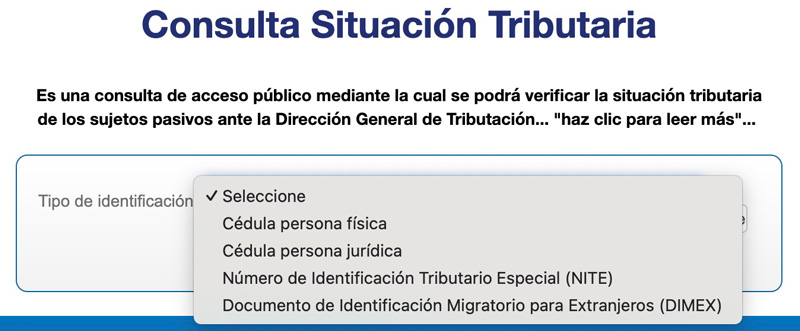
Starting with the top you have the options to choose either the ID of a person, secondly the registration number of a company, thirdly a special registration number given to foreigners when not yet immigrated or lastly the DIMEX, which is a personal ID number of immigrated foreigners. Those cover all types of tax entities available in the country. In this example we’ll focus on option 2, representing a legal company. Right after choosing an option you’ll be directed to another form in which you can either enter the name or the registration number of the company.
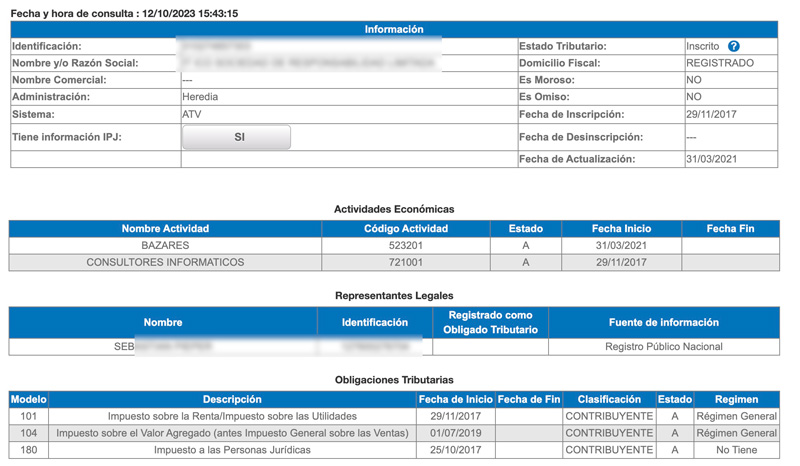
On the result sheet you’ll be able to see information like, if the company hasn’t paid their tax, with even a clickable button showing then on how much they are behind in payment, including the type of tax. You can see the legal activities the company has registered with and is operating in as well as the legal representatives, including their name and ID numbers of this very company.
Panama
Panadata
In Panama the publicly available tools are slightly different in our options on how to vet a company. The first option we have that doesn’t require registration is Panadata, that you can find by clicking here. They even offer an interface in English.
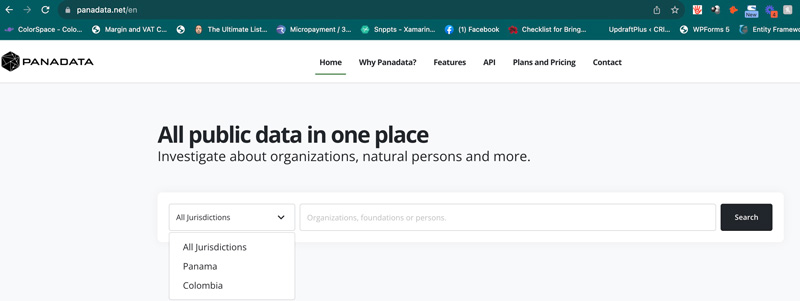
After selecting Panama and entering the companies name it will show a list of results that contain the name or word that you are searching for with clickable buttons next to each company found. That then guides you to show more information.
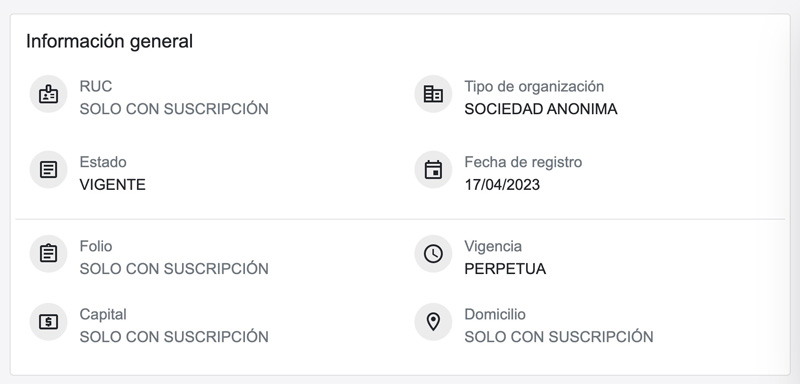
Panadata’s free search is somewhat limited, but it shows the type of the company, the status and when it was registered. To find out more about this company on panadata, there is the option to subscribe for a fee.
Public Registry Panama / Registro Público de Panamá
A second option is the Public Registry Panama / Registro Público de Panamá following this link. A slight inconvenience is that it requires registering, but you’ll be rewarded with more detailed information on the company itself.
2. Check the company’s Ministry of Health / Caja del Seguro Social status
Every company in Costa Rica and Panama has to pay their employees health insurance, which is collected by their respective institution called Caja. This is the reason we’ve included this in our How to vet a company guide for both countries.
Costa Rica
For Costa Rica this is the public health ministry site / caja to check if a company is currently up date with their payments. The most commonly option you’d want to select is the second one again, called “cedula juridica”, which is the companies overspanning registration number for tax and all other institutions. Once entered all information it will show you if the company is up to date with their payments and also the amount due if not.

Panama
Panama has a similar tool available on the Caja / Ministry of Health website https://morosos.css.gob.pa/ . At the writing of this article that tool has been in and out of service. Another option that the CAJA in Panama provides is the yearly lists of companies that are behind in their payments. Those can be found as well on their website.
3. Check the company’s tax status
You can do this on the website of the Panamanian Revenue Authority or the Costa Rican Tax Administration. This will show you if the company is up-to-date on its taxes.
Costa Rica
For Costa Rica this spot is the Hacienda, as previously described above in point 1. Follow this link to reach their website.
Panama
The name of the Panamanian Revenue Authority in Spanish is Dirección General de Ingresos (DGI). It is the government agency responsible for administering tax collection and public revenues in Panama. As of our current knowledge Panama does not have the possibility to publicly review the tax situation of a company, but that can change in the future. We invite you to keep reviewing their website.
4. Look for any news or reviews about the company
Costa Rica and Panama
This applies to both countries in our guide of how to vet a company. The most common place to look for reviews is Google’s search engine. Many physical businesses have their own Google business section with their reviews immediately available. Another very common place to look for the business is on Google Maps, which then shows similar information like the image below. Those reviews are clickable and can be read.
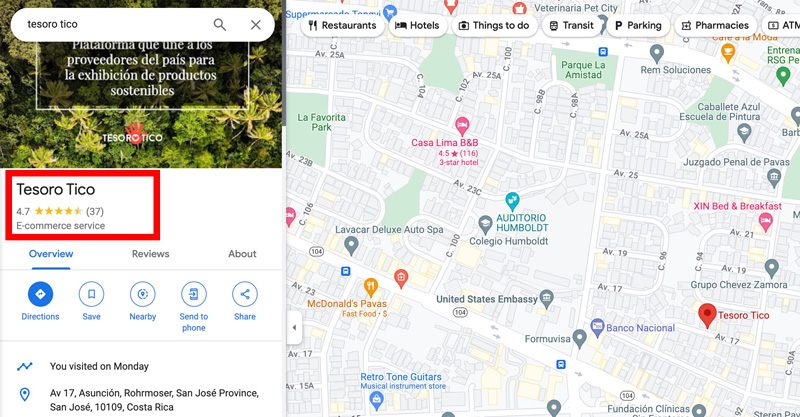
There are a number of other places where you can find company reviews, including:
- Online review sites: There are a number of websites that allow users to post reviews of companies, such as Glassdoor, Indeed, and Yelp. These websites can be a good place to get feedback from current and former employees, as well as customers.
- Social media: Many companies have a presence on social media, such as Twitter, Facebook, and LinkedIn. You can check these pages for reviews and feedback from other users.
- Industry publications: Many industry publications publish articles and reviews of companies. You can find these publications online or at your local library.
- Word-of-mouth: Talk to your friends, family, and colleagues to see if they have any experience with the company you are considering doing business with.
When reading company reviews, it is important to keep in mind that not all reviews are created equal. Some reviews may be biased or inaccurate. It is important to read a variety of reviews and to consider the source of the review before making a decision.
Here are some tips for evaluating company reviews:
- Consider the source of the review. Is the reviewer a current or former employee? A customer? A competitor?
- Read the review carefully. Is it well-written and informative? Does the reviewer provide specific examples to support their claims?
- Be wary of reviews that are all positive or all negative. It is more likely that a company has a mix of positive and negative reviews.
- Consider the overall tone of the review. Is the reviewer angry, frustrated, or satisfied?
- Use your judgment. When you are done reading all of the reviews, what is your overall impression of the company?
Company reviews can be a valuable resource for making informed decisions about which companies to do business with. However, it is important to be critical of the reviews you read and to consider all of the factors involved before making a decision. You can do this by searching online or talking to other people who have done business with the company.
5. Contact the company and ask questions
This is a good way to get a better understanding of the company’s business and to assess its professionalism.
Here are some additional tips for vetting a company in Panama and Costa Rica:
- Be wary of companies that offer too-good-to-be-true deals.
- Make sure the company has a phone number that you can verify.
- Ask for references from other customers.
- Do not sign any contracts or provide any money until you are satisfied that the company is legitimate.
Conclusion on How to vet a company
By following these tips on how to vet a company, you can thoroughly vet a company in Panama and Costa Rica and reduce your risk of doing business with a fraudulent or unreliable company. We provided a step-by-step guide on how to vet a company in Panama and Costa Rica. We will also share some additional tips to help you protect yourself from fraud and ensure that you are doing business with a reputable company. We would also like to keep our Article “How to vet a company” up-to-date, so feel free if to let us know in the comments any other options that you know of. Contact us for any questions that you might have, keep reviewing our blog at: https://expat-tations.com or download our apps for IOS / IPHONE / IPAD or ANDROID



